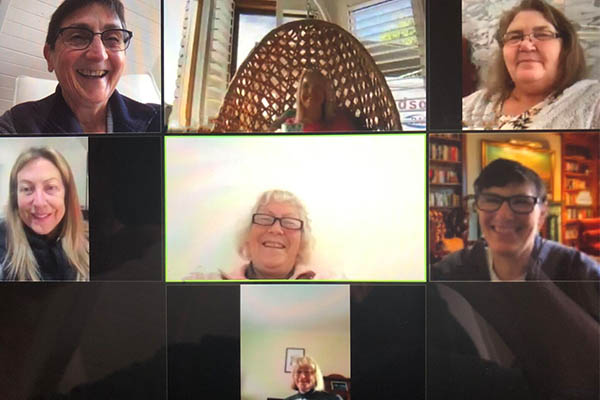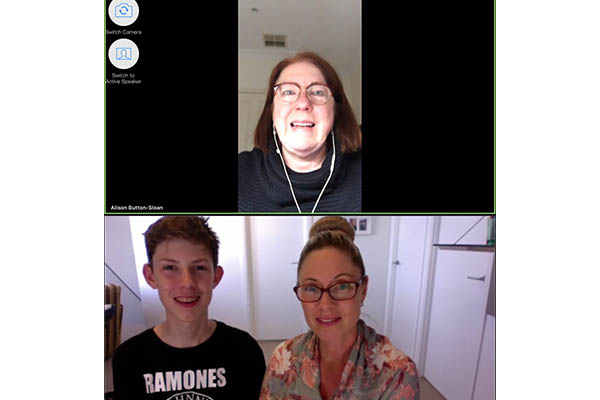
Photo caption: Judy (top left) and the Beyond Pink Metastatic (Advanced) Breast Cancer Support Group.
Cancer support groups provide a vital connection for people going through similar experiences. Yet with physical distancing putting a hold on face-to-face meetings, video calls are now helping to bring support groups together.
Despite initial reservations, the desire to connect and support each other has given these cancer support groups a push to embrace new technology and transition from face-to-face gatherings to online meetings.
“It’s fantastic! I love being able to have face-to-face support, information and updates by video,” said Sharon from the Beyond Pink Metastatic (Advanced) Breast Cancer Support Group.
Sometimes you just need an overwhelming force to spring you into action and try new things.
With the help of platforms such as Zoom, Microsoft Teams, Google Hangouts and Skype, these groups are meeting regularly and giving each other much needed support during an isolating time. Many are free to use – you just need internet connection.
More people can attend
Being able to stay in your home and still connect with people for support has seen many groups like Melanoma Patients Australia (Melbourne) Group start running video meetings with group members to keep in touch and connected. This group in particular has observed an increase in ‘attendance’ at the online meetings.
“Some group members who were recently post-operative were able to jump online whereas they would have had to skip an in-person meeting due to not being up to attending,” said Alison Button-Sloan, the group’s leader.
“Another benefit has been people in regional areas, who usually can’t attend the face-to-face meetings due to the distance, can now join in via Zoom.
“Overall the experience of using new technology has been overwhelmingly positive and relatively easy; we even had people in their 70’s embracing the new technology and enthusiastic about the video calls.”

Photo: Alison, and some of the Melanoma Patients Australia (Melbourne) Group.
Persistent pets a highlight
For the Beyond Pink Metastatic (Advanced) Breast Cancer Support Group, people appearing sideways on the screen because they had their iPad sideways and persistent pets have been some of the funnier moments their group has experienced as they navigate the video calls.
“We had one situation where people were remarking on the beautiful room one group member was sitting in, which in fact was a pre-set screen background,” said Judy Margolis, group leader.
While pets have also provided amusement to those on the video calls and comfort to those who have them by their side.
"We’ve had group member’s pets become part of the meetings - one dog barking at the screen, one cat loudly demanding food, another dog looking at the screen with interest as she sat in her owner’s lap.”
The future of video calls
Both groups can see a place for video calls in the future but agree there will always be a need for face-to-face meetings. Whilst the technology helps to keep connected, it can be hard when group members become distressed during online discussions.
“The greatest challenge has been the inability to physically reach out to people when they’ve become distressed during a meeting or just need a hug,” said Alison.
“In those situations, we check if they have someone there with them to provide comfort or a friend they can call for more support. I will also often call them after the meeting to check in.”
Video calls also allow groups to meet more regularly, giving them greater flexibility and potential to reach more people.
"Given the success of our Zoom meetings, we will possibly run them in the future for specific topic discussions in between our regular monthly meetings,” said Judy.
“So many more people can attend our meetings using this platform especially from the regional and remote areas,” said Alison. “When the COVID-19 social-distancing restrictions ease, we’re canvassing the feasibility of running two groups – one face-to-face and the another via Zoom to extend our reach and connect with even more people.”
About Cancer Support Groups
Cancer Council Victoria has more than 120 recognised support groups around the state that meet regularly with trained leaders to provide group support to people affected by cancer.
Briony Squibb, Cancer Council Victoria’s peer support programs coordinator said groups generally meet face-to-face and provide an opportunity for people to discuss their cancer in an emotionally supportive environment, with people in a similar situation.
"Since COVID-19, we've had 26 support groups start using video calls to continue to meet and support each other," said Briony. “With several more looking to start using video soon.”
Advice for support groups
For groups thinking of running their meetings via video, Alison and Judy have the following, collective advice:
- Don’t be frightened of the technology and don’t assume older people are less likely to want to try it.
- Give clear access instructions via email or text message on how to download/ use the video (ie. Zoom).
- Email your group with the video link a few days before the meeting so they can plan ahead and put the date/time in their diaries.
- Encourage people to have trial runs before the day of the meeting so they’re familiar with how it works.
- Be prepared for ‘practice runs’ at first, while people become familiar and comfortable with the technology. If necessary ‘walk’ people through the process in a one-on-one practice session.
- Send reminders via email or text a couple of days before each meeting.
Video Call Tips Fact Sheet
For further tips on running successful meetings via video see our fact sheet.
Download fact sheet